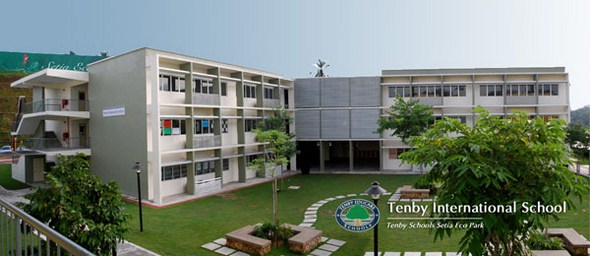Tenby Schools Setia Eco Park in Shah Alam, Selangor, Malaysia
 Tenby Schools Setia Eco Park is a purpose-built school located on a 14-acre site. The school offers top-class international education from Early Years up to Secondary Level. In less than two years since its establishment, Tenby Schools Setia Eco Park has already become one of the most popular international and private schools in Malaysia. Boasting a strong faculty of teaching staff and state-of-art facilities, the school is fast becoming a benchmark for cost-effective international education in Malaysia and beyond.
Tenby Schools Setia Eco Park is a purpose-built school located on a 14-acre site. The school offers top-class international education from Early Years up to Secondary Level. In less than two years since its establishment, Tenby Schools Setia Eco Park has already become one of the most popular international and private schools in Malaysia. Boasting a strong faculty of teaching staff and state-of-art facilities, the school is fast becoming a benchmark for cost-effective international education in Malaysia and beyond.
Preschool / Kindergarten
The Preschool / Kindergarten is a half-day programme. The main focus of the Preschool programme is learning through play. The school adopt a hands-on approach to learning which allows the child to have fun exploring the world, while developing their physical, cognitive and social skills in a creative way.
The Kindergarten will be following the Early Years programme of the International Primary Curriculum based on the British National Curriculum. While this programme allows for learning through play, it provides a sound basis for entry to either the international or Malaysian school.
The Primary School
Primary school students in the international school follow the International Primary Curriculum (IPC). This brand new curriculum development is being rapidly taken up by international primary schools all over the world. The IPC is based on the British National Curriculum but is adapted for international students. It follows a child-centred thematic approach but with rigorous assessment ensuring that each child not only enjoys assessment ensuring that each child not only enjoys his/her schooling but also attains the highest possible standards. External assessment at the end of Key Stage 2 is through Cambridge International Primary Programme Test administered by Cambridge International Examinations.

The Secondary School
Secondary school students in the international school follow the programmes of study of the British National Curriculum appropriately modified for international students. To the end of Key Stage 3 (age 14), all students study the core subjects of English, Mathematics, Science and Information Communication Technology (ICT) together with Geography, History, Design & Technology, Music, Drama, PE, Art and two further languages (one of which will be Bahasa Malaysia and Mandarin is encouraged as the second). External assessment at the end of Key Stage 3 is through the Checkpoint tests administered by Cambridge International Examinations.
In Key Stage 4 (Years 10 & 11), students in the international school choose from a range of courses leading to the IGCSE (International General Certificate of Secondary Education) examinations. All students follow courses in English, Mathematics and ICT and must choose at least one science. A range of other subjects including Geography, History, Business Studies, Economics, Art, Malay, Mandarin, Design & Technology and Additional Mathematics are also available.
At both secondary key stages, a programme of Personal, Social and Health Education (PSHE) is also provided to all students and, in addition, all Muslim students are required to take lessons in Agama.
Tenby Schools Setia Eco Park School Hours
Nursery & Reception
Start of School: 0830
Break: 0930 – 1000
Lunch: 1130 – 1215
School Ends: 1315
ECA: Not applicable
Key Stage One (Years 1 & 2)
Start of School: 0745
Break: 1000 – 1030
Lunch: 1215 – 1315
School Ends: 1400
ECA: Not applicable
Key Stage 2 (Years 3 to 6)
Start of School: 0745
Break: 1000 – 1030
Lunch: 1200 – 1300
School Ends: 1430
ECA: 1440 – 1540
Secondary (Years 7 to 9)
Start of School: 0745
Break: 1020 – 1040
Lunch: 1245 – 1330
School Ends: 1430
ECA: 1440 – 1540
British National Curriculum
Kindergarten
Children in the Kindergarten follow the Early Years Programme of the International Primary Curriculum based on the Foundation Stage of the National Curriculum of England. Children in the Kindergarten follow a shortened school day. The main focus of the programme is learning through activity and play. The school adopt a hands-on approach to learning which allows children to have fun exploring the world, while developing their physical, cognitive and social skills in a creative way. While this programme allows for learning through play, it prepares the child for entry into the more formal setting of Junior School. There is a structured programme through which the teacher monitors and tracks the progress of each individual child.
International Primary Curriculum (IPC) Key Stage 1 & 2
The Infant and Junior school currently uses the International Primary Curriculum (IPC) for teaching and learning. The IPC is based on the British National Curriculum (BNC) which has been internationalised to suit the changing trend of learners cultural backgrounds, especially in International Schools around the world.
Cambridge Lower Secondary Programme (Key Stage 3), Year 7 – 9
The Cambridge Lower Secondary Programme is a framework for students approximately 11 – 14 years old. The Lower Secondary Programme has been developed to link with the Cambridge International Primary Programme and provides standardised tests to allow careful monitoring of progress from primary to lower secondary phases. It also provides excellent preparation for students embarking on IGCSE courses.
It builds on the primary stage, and develops children’s knowledge and skills in Mathematics, English and Science. Lower Secondary also offers schools a means of tracking student progress through the lower secondary phase, with an integrated package of teaching, learning and assessment materials.
At the end of Lower Secondary, students sit the Cambridge Checkpoint tests which provide detailed feedback on students’ strength and weaknesses before they move into the 14 – 16 / IGCSE stage.
Cambridge Checkpoint tests are standardised, set and marked by CIE, so provide an international benchmark of student achievement enabling teachers to advise students and parents of the suitability of different progression routes.
International General Certificate of Secondary Education (IGCSE) and International Certificate of Education (ICE), Year 10 – 11
The International General Certificate of Secondary Education, or IGCSE, is an international qualification for school students. The IGCSE is typically taken by 14 – 16 year olds, and it prepares students for further academic work, including progression to A Level, AS Level study and the IB Diploma Programme.
Cambridge IGCSE provides a broad study programme and covers subjects from different areas of study: Languages, Humanities, Social Sciences, Mathematics, Creative, Technical and Vocational Studies. With a choice of Core and Extended papers in most subjects, IGCSE is suitable for students of different ability levels. Some IGCSE subjects can be taken with or without coursework, making it suitable for schools with less specialised staff.
The IGCSE allows teaching to be placed in a localised context, making it relevant in different regions. It is intended to be suitable for students whose first language may not be English and this is acknowledged throughout the examination progress.
Cambridge ICE is the group award of the International General Certificate of Secondary Education (IGCSE) and requires the study of subjects drawn from the five different IGCSE subject groups. It gives schools the opportunity to benefit from offering a broad and balanced curriculum by recognizing the achievements of students who pass examinations in at least seven subjects, including two languages, and one subject from each of the other subject groups.
Cambridge International Certificate of education (ICE) is the group award of the IGCSE and requires the study of subjects drawn from the five different IGCSE subject groups. It shows that the student has achieved success on a broad and balanced curriculum. To achieve the ICE students have to pass IGCSE examinations in at least seven subjects, including two languages, mathematics, a humanities subject, a science and a creative, technical or vocational subject.
At Tenby International School all students at Key Stage 4 will follow IGCSE courses in English (first or second language), mathematics, at least one science (biology, chemistry, physics or ‘Double Award Science’), ICT, at least one language other than English (for Malaysian students Bahasa Malaysia is compulsory) and up to five further subjects.
Malaysian National Curriculum
The primary and secondary schools follow the Malaysian National Curriculum. Students following this curriculum will sit the UPSR (Std.6), PMR (Form 3) and SPM (Form 5) examinations conducted by the Malaysian Examination Syndicate as their counterparts do in government schools.
Although students clearly follow one or the other curriculum, they come together for breaks and lunches, attend common assemblies and participate in school events such as Sports Days and Productions/Concerts as ONE school community. The common language spoken is English.
As both curricula are offered at the school, teachers use the strengths from both to enhance learning. Hence, pupils not only receive knowledge at text level, they are further encouraged to think critically and apply their learning to the real world. The teaching methods and contents from both systems are merged to challenge students of all ability groups and used flexibly to motivate and encourage achievement.
Facilities at Tenby Schools Setia Eco Park
- A sports complex with a swimming pool, basketball and tennis courts
- A large football field
- Music, drama and art studios
- A multipurpose hall with badminton, basketball, volleyball and table tennis facilities
- An air-conditioned auditorium
- Fully-equipped science, computer and design & technology laboratories
- A large, air conditioned and conducive Library
- ICT facilities in Primary classrooms
- A central reading / activities hub called the Arena Of Knowledge
Location Map of Tenby Schools Setia Eco Park
The school is strategically located just off the Setia Alam interchange of the NKVE. It is a about 20 minutes from Kuala Lumpur, 10 minutes from Subang Jaya and 5 minutes from Klang.

Tenby Schools Setia Eco Park Contact Details
Tenby Schools Setia Eco Park
No. 1, Jalan Setia Tropika U13/18T,
Seksyen U13,
40170 Shah Alam,
Selangor, Malaysia.
Tel: +6(03)3342 1535
Fax: +6(03)3344 2292
Email: ecopark@tenby.edu.my
